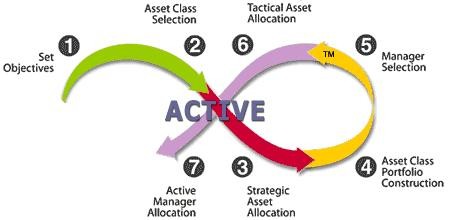Investment Advisory Services
With the "information age" it seems that markets respond more rapidly creating much more volatility. The manner in which we operate today has to be different than what we did 20 years ago
As Will Rodgers once said, "Even if you are on the right track, you'll get run over if you just sit there."
THE PROBLEM
Markets move up and everyone is satisfied with their results. We have discovered that most  investors have the perception that since their Asset Allocation is performing well for them they don’t need to do anything at all. What happens when the markets begin to slide? Interestingly enough, these same investors don’t do anything at all. However, our experience has confirmed that when markets fall dramatically many investors hit a panic stage, emotions take over and logic is disregarded. During these times investors are locking in losses as they move to cash and eliminate buying opportunities by not maintaining their disciplined investing strategies. As we see it, there are 2 major problems with normal human behavior as it applies to investing:
investors have the perception that since their Asset Allocation is performing well for them they don’t need to do anything at all. What happens when the markets begin to slide? Interestingly enough, these same investors don’t do anything at all. However, our experience has confirmed that when markets fall dramatically many investors hit a panic stage, emotions take over and logic is disregarded. During these times investors are locking in losses as they move to cash and eliminate buying opportunities by not maintaining their disciplined investing strategies. As we see it, there are 2 major problems with normal human behavior as it applies to investing:
- During a market upturn, mediocre investments are generally seen as acceptable, and
- During market downturns investors are taught to just stay invested not understanding that substantially reducing severe short term losses increase opportunities for long term gains.
THE SOLUTION
 If there were no change in the economic system, investors can safely assume that past returns will be repeated in the future. In this world, asset class returns, volatility, and the correlation for all asset classes can be modeled using traditional techniques like strategic asset management. The investment advisor’s role would be to simply provide a fixed diversified portfolio based on the Efficient Frontier. However, the economic system does have changes occurring; country debt levels are higher than ever before, emerging markets are creating a new world of opportunities, industries are changing, and legislation always creates new issues for investors. Tactical asset allocation takes advantage of the changing landscape and demands risk management in the process. Tactical asset allocation is an ongoing and active style of managing your asset allocation.
If there were no change in the economic system, investors can safely assume that past returns will be repeated in the future. In this world, asset class returns, volatility, and the correlation for all asset classes can be modeled using traditional techniques like strategic asset management. The investment advisor’s role would be to simply provide a fixed diversified portfolio based on the Efficient Frontier. However, the economic system does have changes occurring; country debt levels are higher than ever before, emerging markets are creating a new world of opportunities, industries are changing, and legislation always creates new issues for investors. Tactical asset allocation takes advantage of the changing landscape and demands risk management in the process. Tactical asset allocation is an ongoing and active style of managing your asset allocation.
 THE PROCESS
THE PROCESS
- The establishment of your objectives and determine your risk profile,
- Creation of a strategic asset allocation to maximize reward potential,
- Construction of the asset class portfolio,
- Fund selection - important to identify top managers
The next two steps in the process are crucial and are the foundation of the theory of Tactical Asset Allocation. Investors find themselves in a rapidly changing world and trecent bear markets reveal the  extreme volatility that presents a new challenge for investors. Tactical Asset Allocation presents an active management strategy of rebalancing the percentage of assets held in various categories in a portfolio to take advantage of market pricing anomalies or strong market sectors.
extreme volatility that presents a new challenge for investors. Tactical Asset Allocation presents an active management strategy of rebalancing the percentage of assets held in various categories in a portfolio to take advantage of market pricing anomalies or strong market sectors.
Tactical Asset Allocation is a proactive process that is usually triggered by macroeconomic events. Each asset class will respond to these economic events in a different manner making it vital to understand the impact of each event on a particular asset class. Therefore, on a daily basis, we evaluate all asset classes being utilized in an attempt to detect any developing trends.
NOTE: In accordance with Securities and Exchange Commission (SEC) rule 204-3, a brochure providing information about the qualifications and business practices of CL Wealth Management, LLC , the "Advisor". A supplemental brochure must also be provided regarding the qualifications and business practices of Louis Michael Jimenez, an Investment Advisor Representative of CL Wealth Managment, LLC the Registered Investment Advisor


